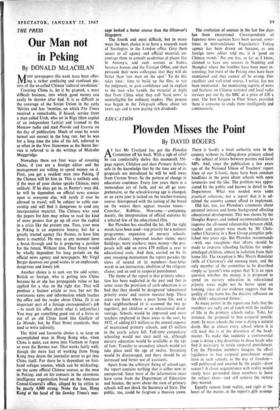Our Man not in Peking
By DONALD McLACHLAN
OST newspapers this week have been offer-
ing a rather confusing and confused pic- ture of the so-called Chinese 'cultural revolution.'
Covering China is, let it be granted, a most difficult business, into which good money can easily be thrown after bad. It is as difficult as the coverage of the Soviet Union in the early 'thirties and late 'twenties, on which The Times received a remarkable, if biased, service from a man called Urch, who sat in Riga (then capital of an independent Latvia) and listened to the Moscow radio and read Pravda and lzvestia on the day of publication. Much of what he wrote turned out correct in the long run; but he was for a long time the joke of the left, referred to as often in the New Statesman as the Secret Ser- vice is referred to in the writings of Malcolm Muggeridge.
Nowadays there are four ways of covering China, if you are a foreign editor and the management are willing to spend money on it. First, you get a resident man into Peking, if the Chinese will let him in. This is unlikely and, if the man of your choice speaks Chinese, most unlikely. If he does get in, as Reuter's man did, he will be dependent on official news sources open to everyone else, will rarely if ever be allowed to travel, will be subject to cable cen- sorship and will find it dangerous to send any interpretative material. The Chinese who read the papers for him may refuse to read the kind of news posters that go up all over the capital in a crisis like the present one. Thus, your man in Peking is an expensive luxury; but for a greatly trusted agency like Reuter, to have him there is essential. He may at any moment have a break-through and he is preparing a position for the future. Without him, Fleet Street would be wholly dependent for long periods on the official news agency and newspapers. Mr Virgil Berger deserves our good wishes in an unpleasant, dangerous and lonely job.
Another choice is to seek out the odd writer, British or foreign, who is getting into China because he or she has propaganda value or has applied for a visa on the right day. That will produce a feature article or two, but not the continuous news and information which teaches the office and the reader about China. (It is an important part of a foreign correspondent's job —to teach his office about what is unfamiliar.) You may get something good out of a Swiss or out of an old China hand like Guillain of Le Monde; but, by Fleet Street standards, they tend to write tediously.
The third and favourite choice is to keep an accomplished man in Hong Kong who, when China is quiet, can move into Vietnam or Japan or even the Borneo war. That works fairly well; though the mere fact of working from Hong Kong may doom the journalist never to get into China itself. For there he is dependent on first- hand refugee sources, which can be misleading; on the same official Chinese sources as the man in Peking; and on his contacts in the enormous intelligence organisation based on the American Consul-General's office, alleged by its critics to be nearly 4,000 strong. None the less, Hong Kong at the head of the Sunday Times's mes- sage looked a better source than the Observer's Singapore.
The fourth and most difficult, but in many ways the best, choice is to have a research team of Sinologists in the London office. Give them access to all agency and official material, en- courage them to consult academics at places like St Antony's, and such sources as banks, business houses and the Foreign Office, and then persuade their news colleagues that they will do better than 'our man on the spot.' To do this takes time : time to build up the files, to test the judgment, to gain confidence and to explain to the men who handle the material at night that from China what they call 'hard news' is unintelligible for ordinary readers. This process was begun in the Telegraph offices about ten years ago and is now paying rich dividends. The confusion of sources in the last few days has been exceptional. Correspondents of Japanese news agencies have been quoted, some- times in mistranslation; Yugoslavia's Tanjug agency has been drawn on because, as one foreign news editor told me, it is 'good on Chinese trends.' No one has, so far as I know, claimed to have any sources in Nanking and Shanghai where the troubles have been most in- teresting; but most of the Peking ones have been mentioned and they cannot all be wrong. One excellent and well-tried source, I notice, has not been mentioned : the monitoring reports of news and features on Chinese national and local radio services put out by the BBC at a price of £36 a year. The best bargain in Fleet Street, provided there is someone to study them intelligently and continuously.






























 Previous page
Previous page